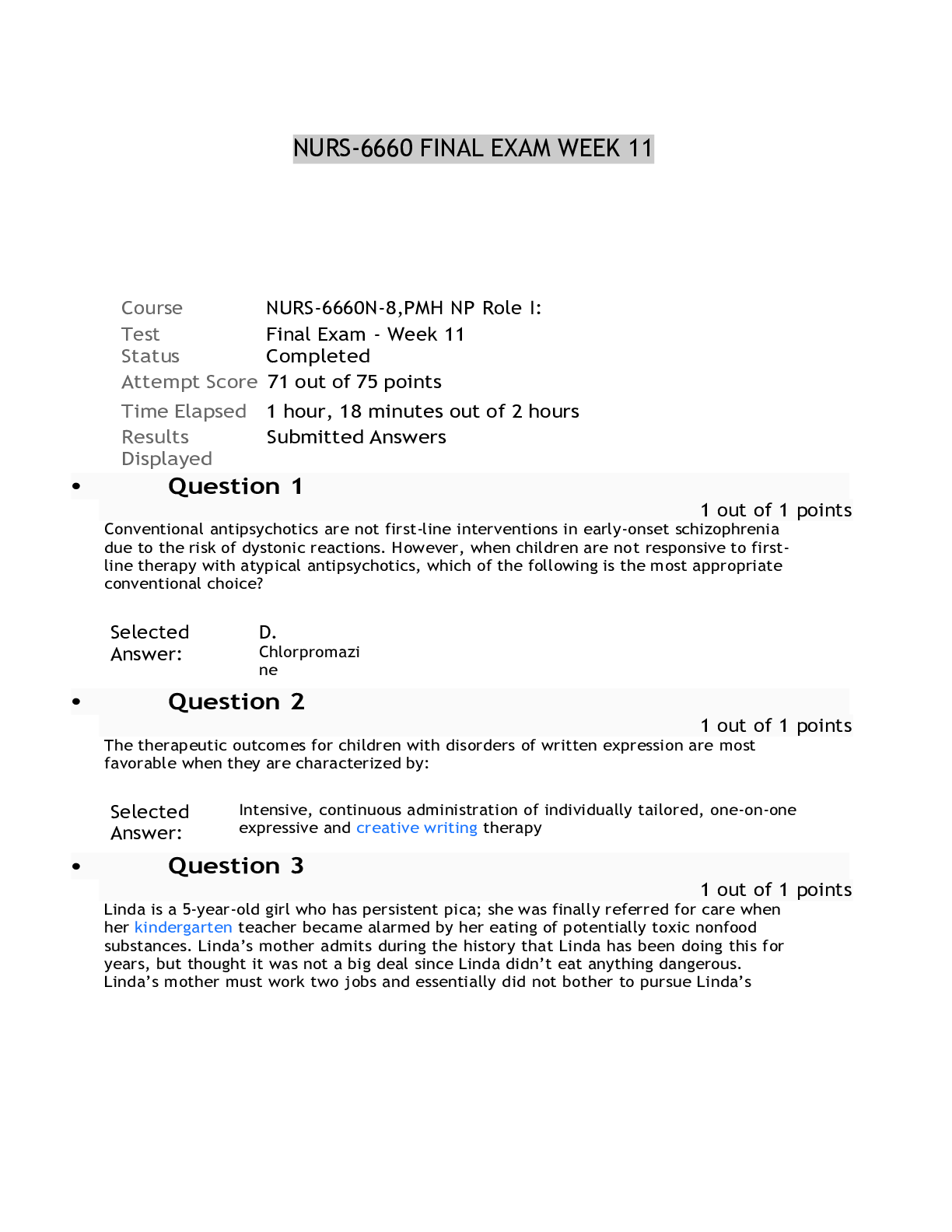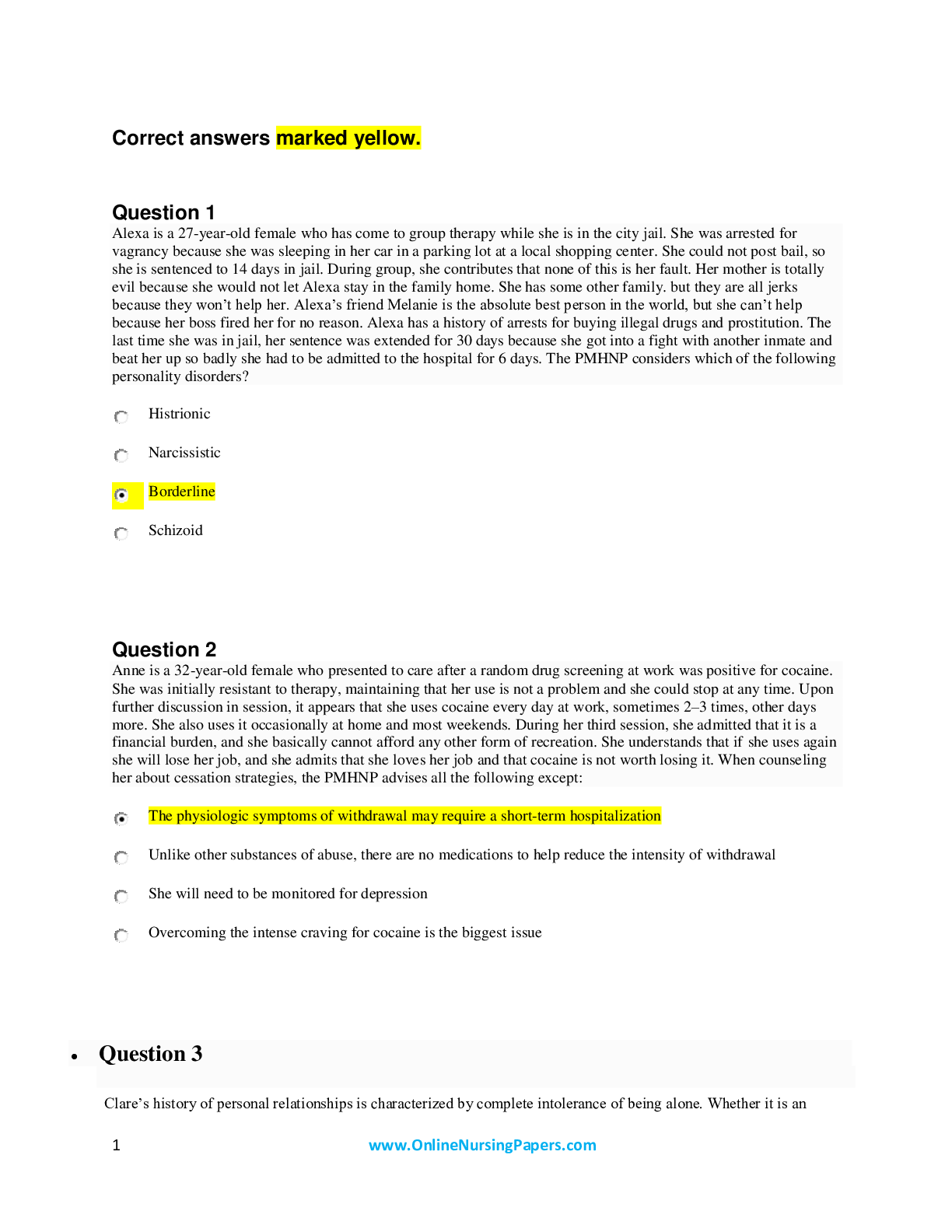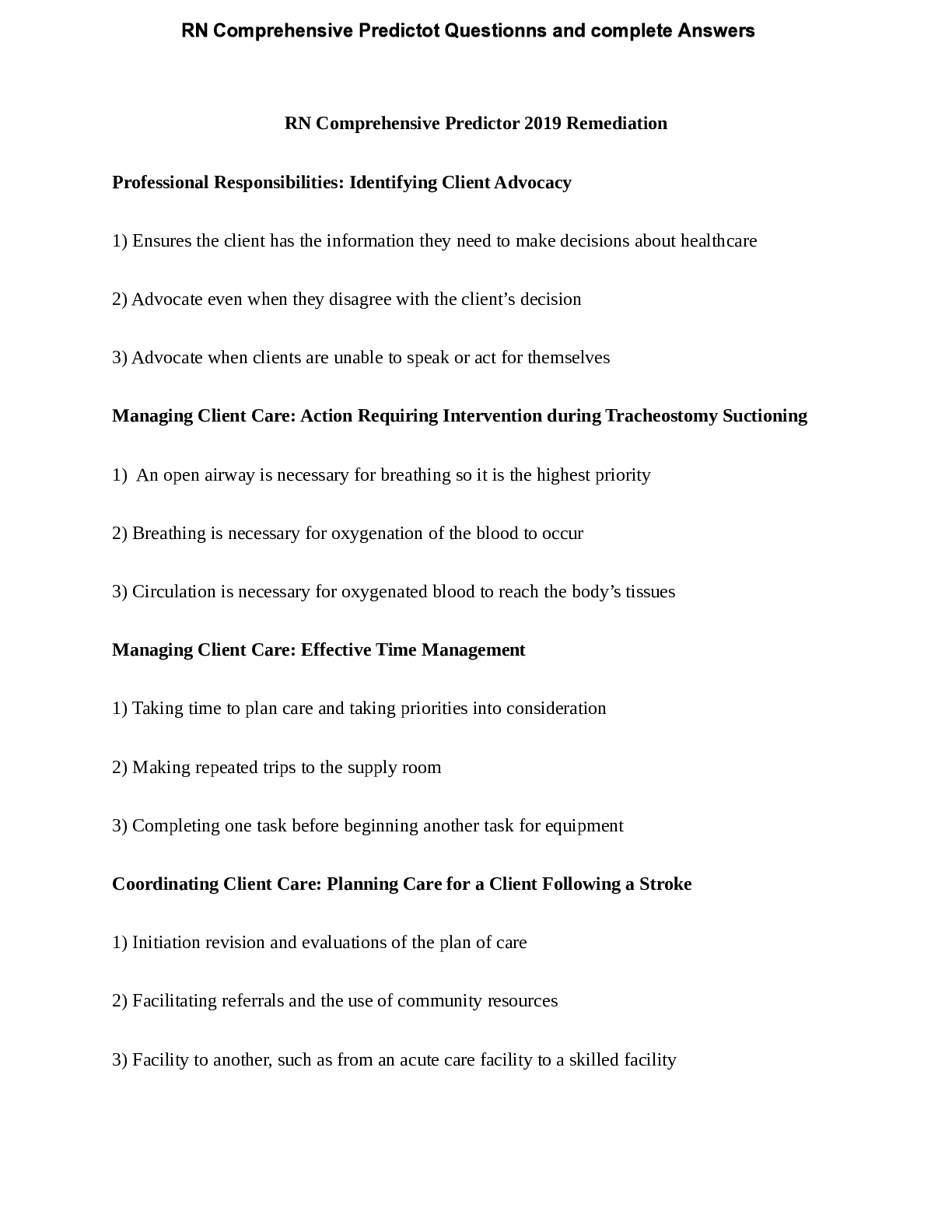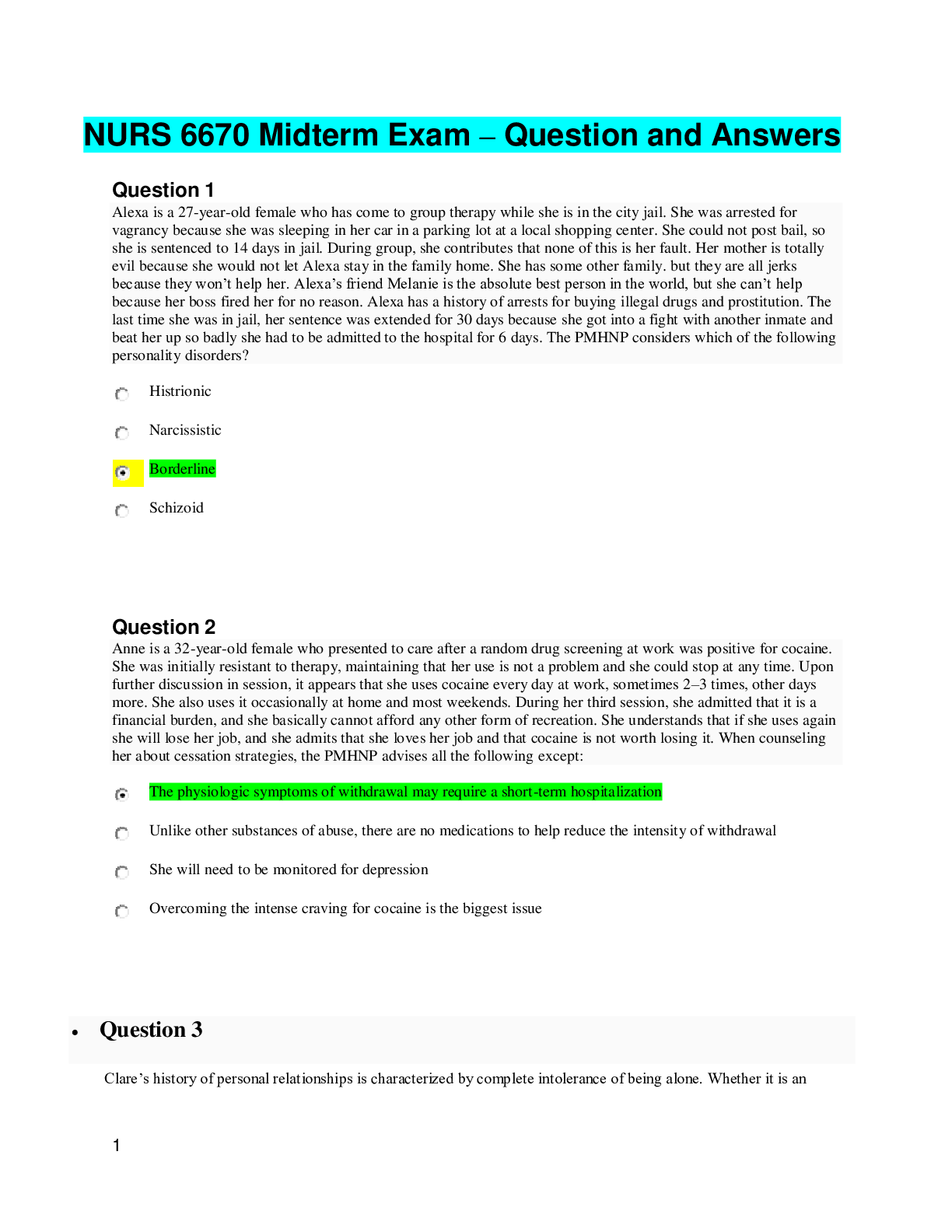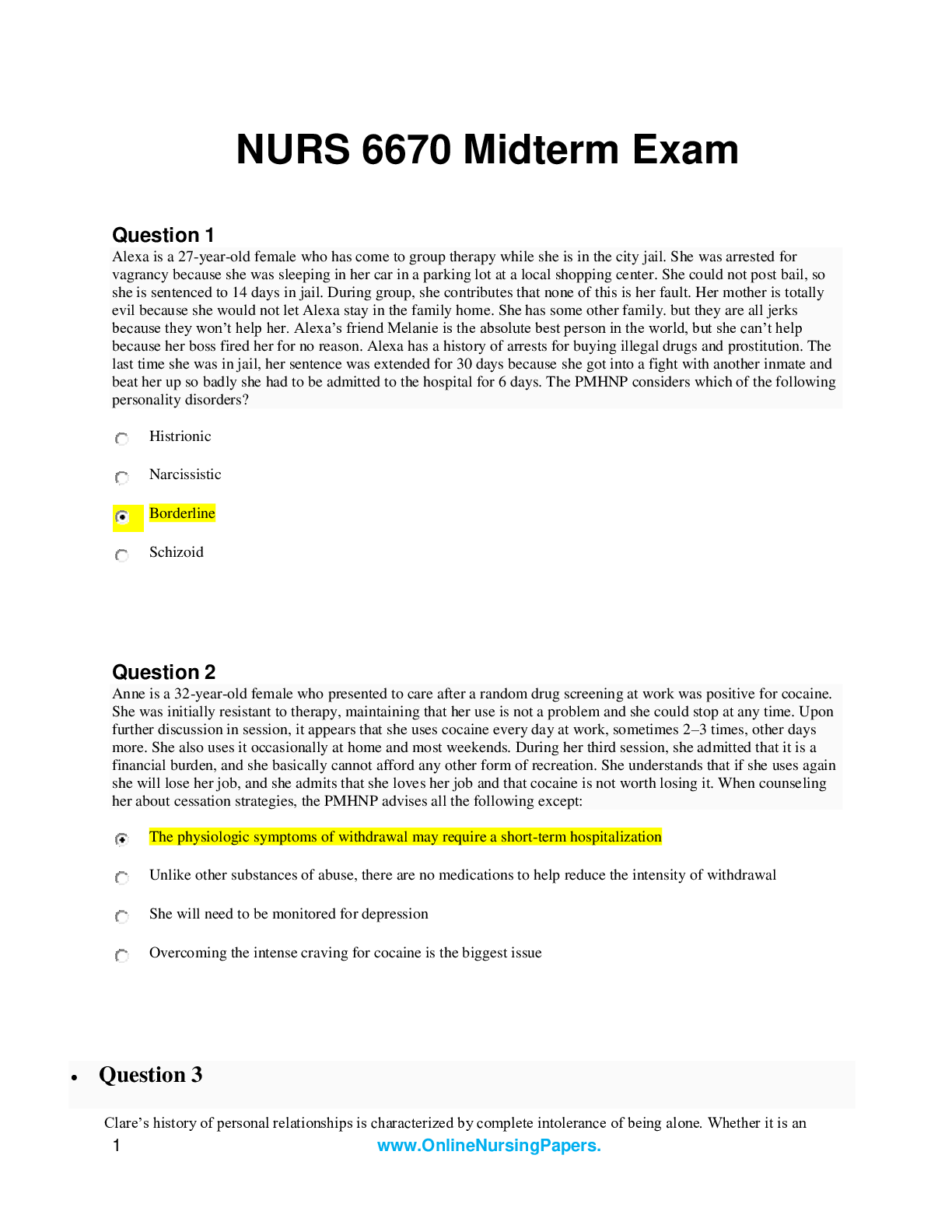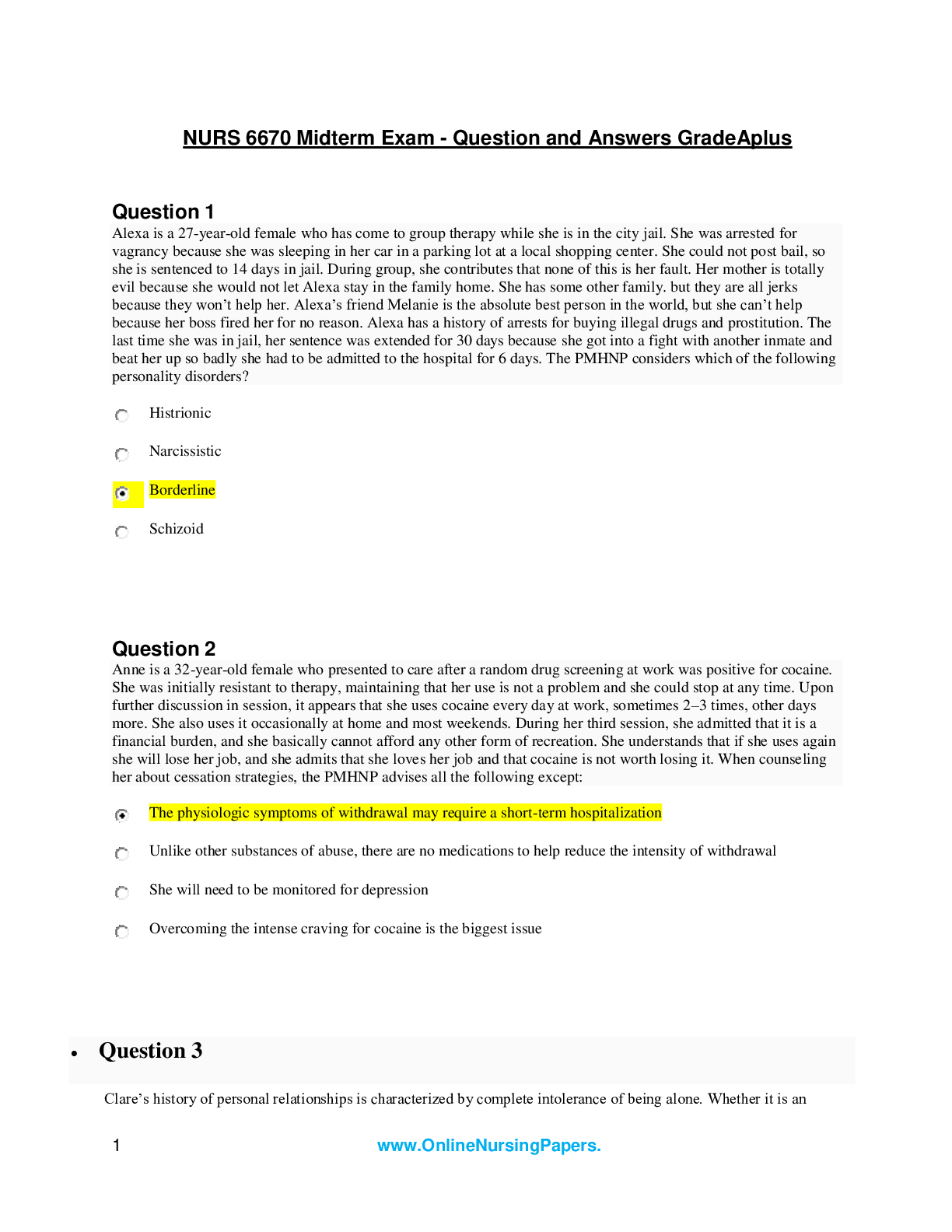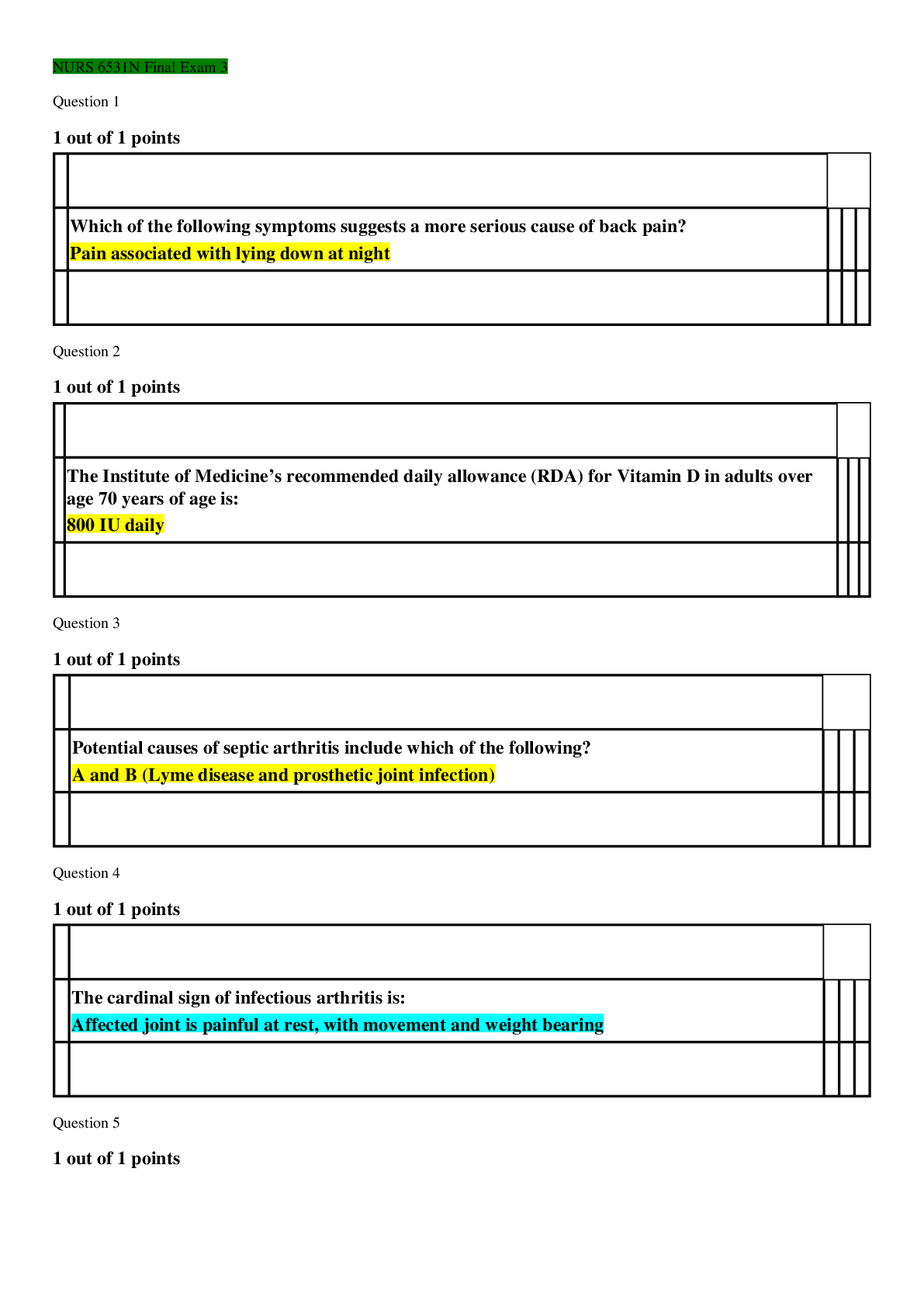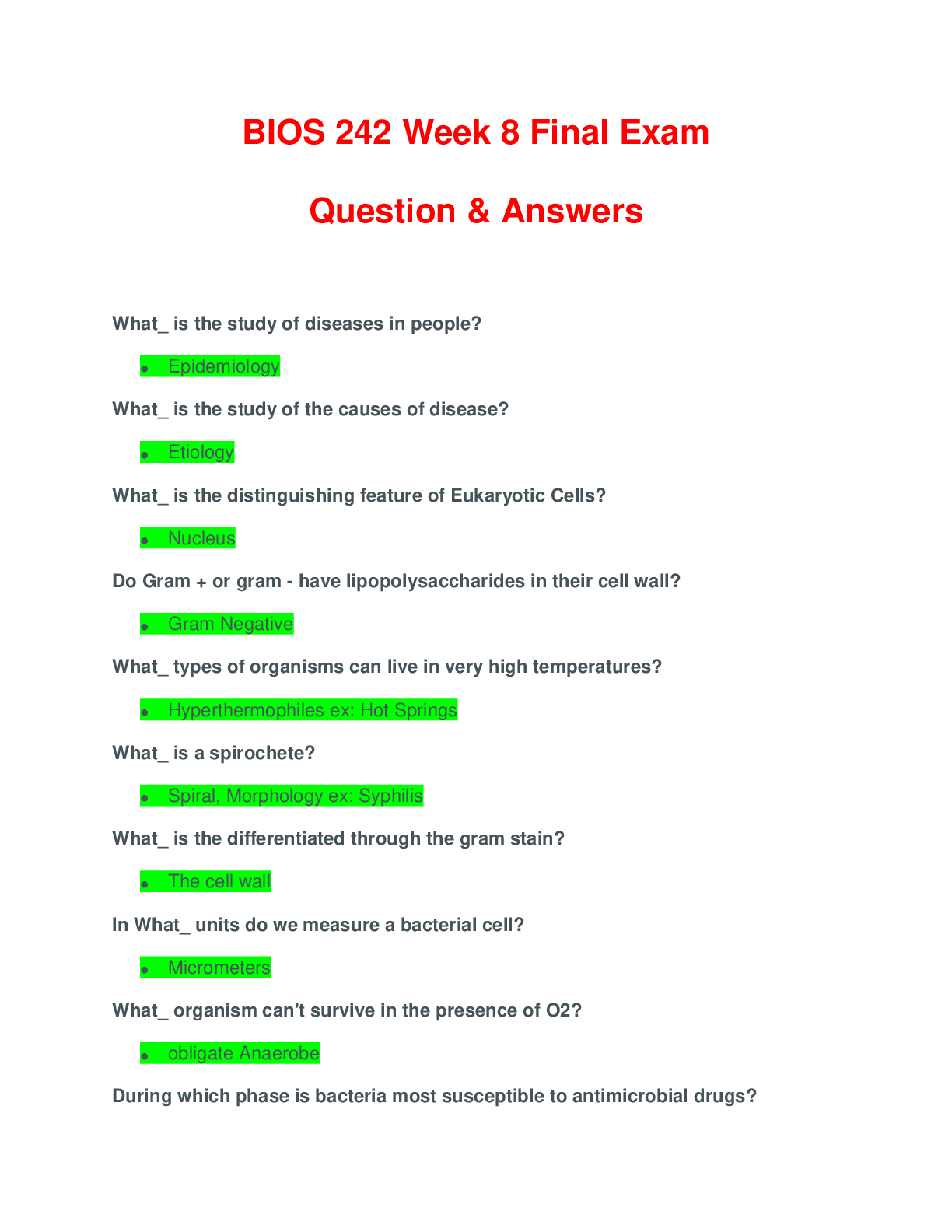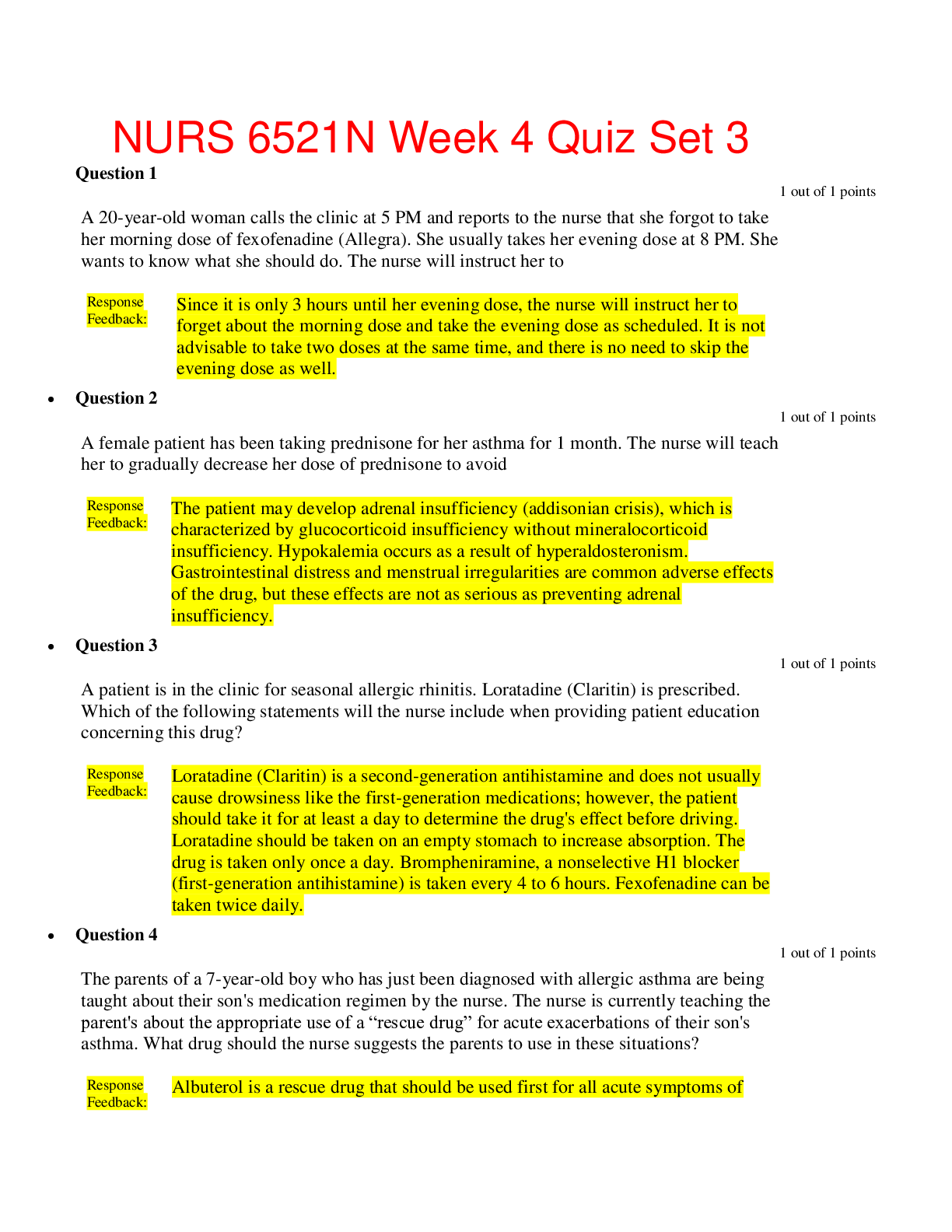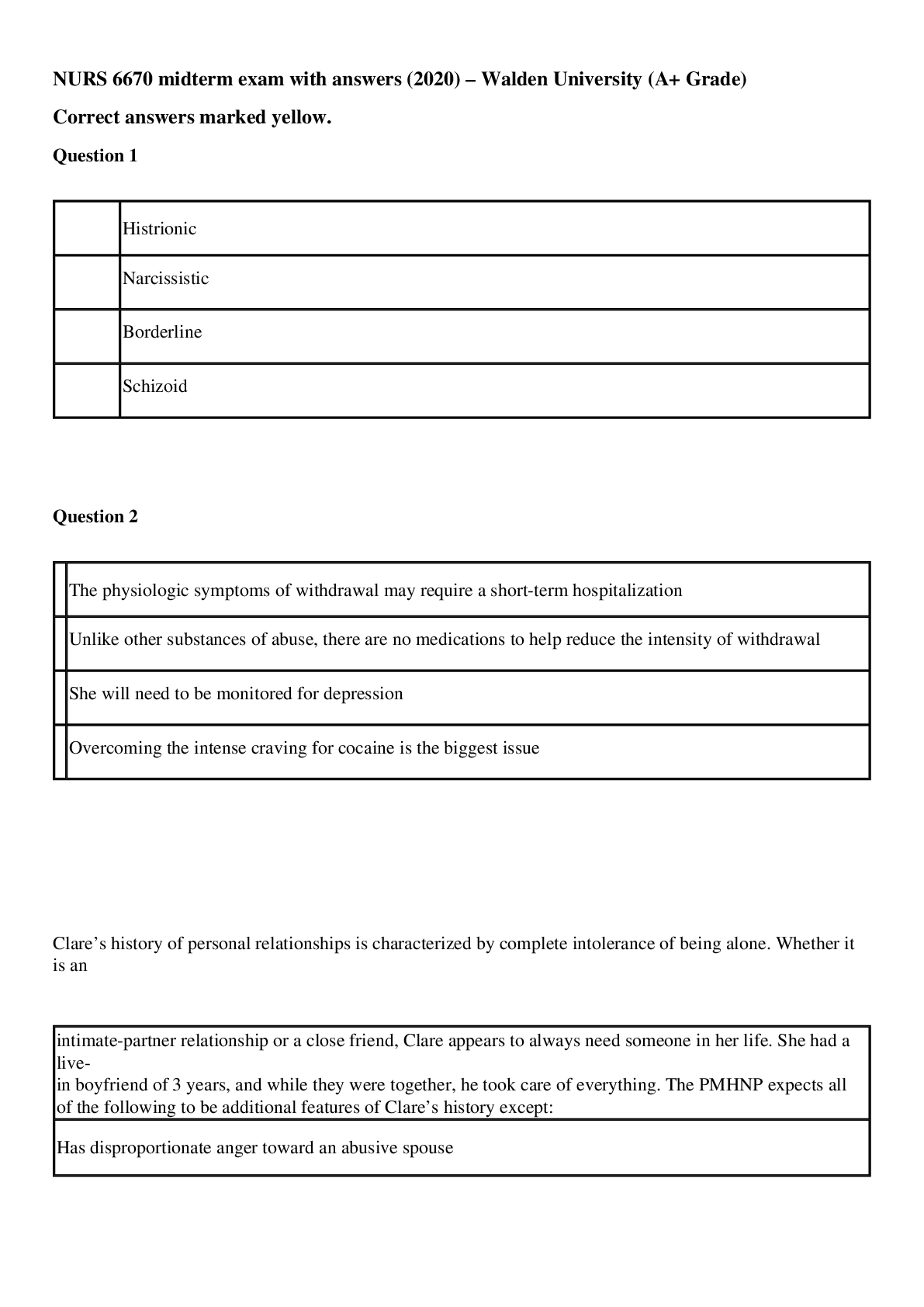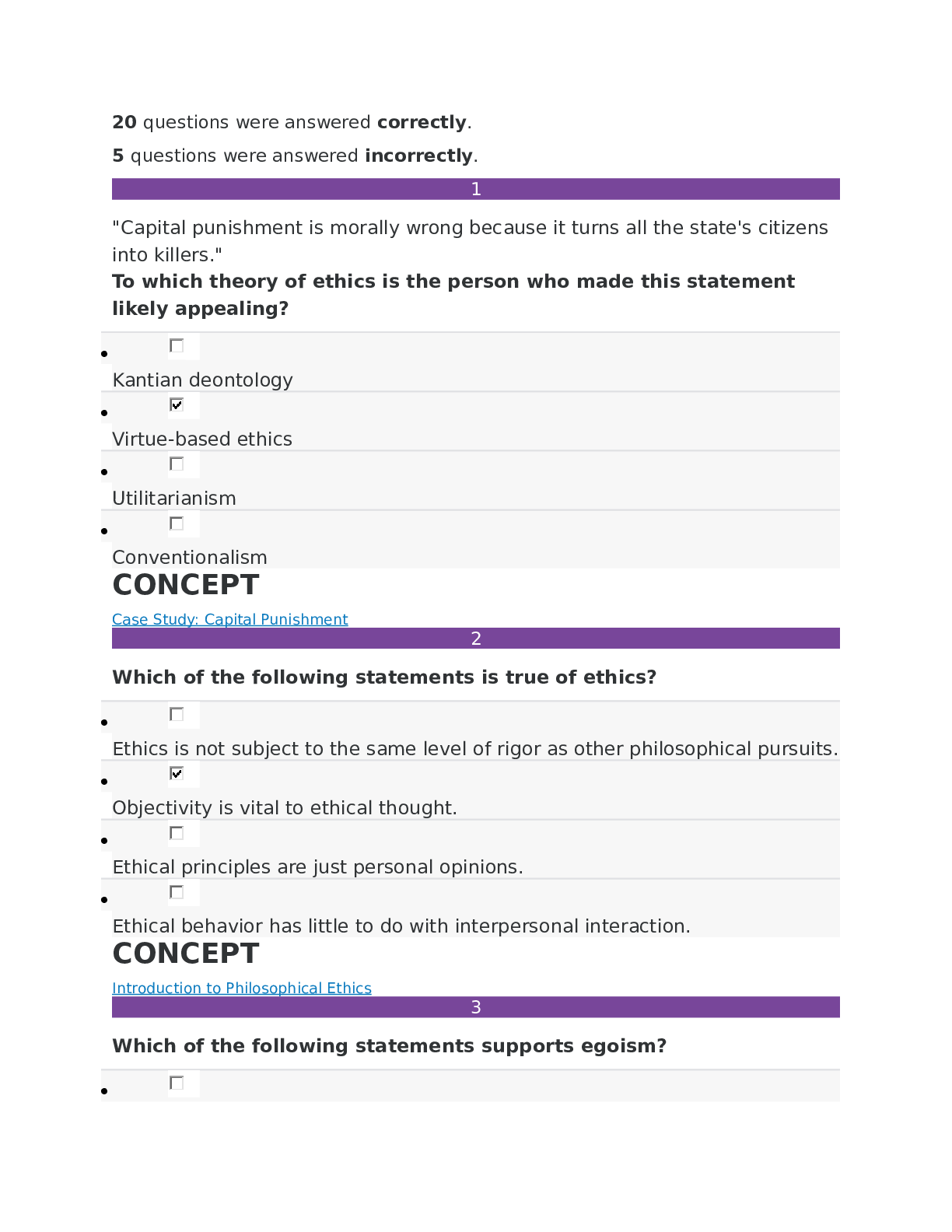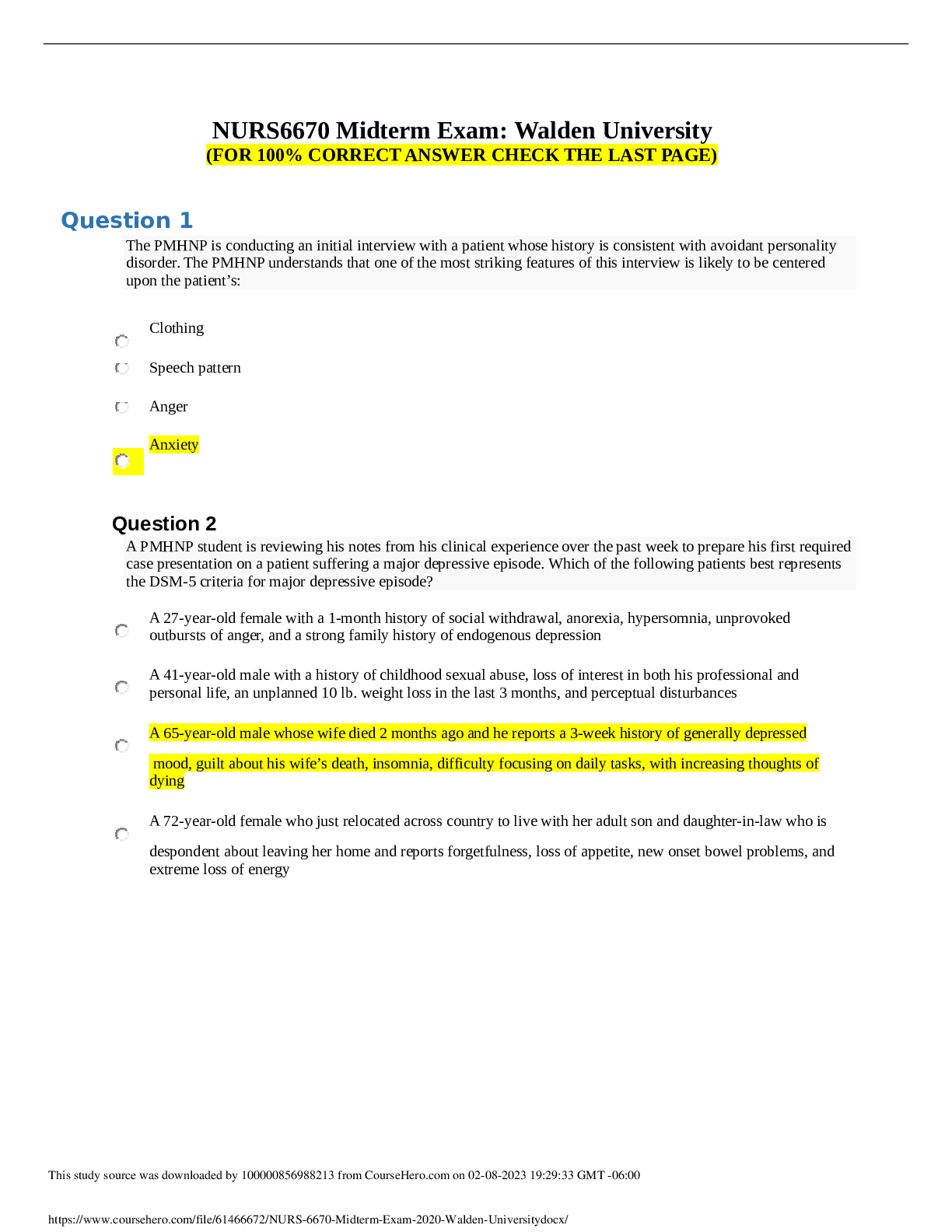*NURSING > EXAM > Walden University:NURS 6670 Midterm Exam Latest-Questions and Verified Answers (Already Graded A) (All)
Walden University:NURS 6670 Midterm Exam Latest-Questions and Verified Answers (Already Graded A)
Document Content and Description Below
Walden University:NURS 6670 Midterm Exam Latest-Questions and Verified Answers (Already Graded A) NURS 6670 Midterm Exam Question 1 Histrionic Narcissistic ... Borderline Schizoid Question 2 The physiologic symptoms of withdrawal may require a short-term hospitalization Unlike other substances of abuse, there are no medications to help reduce the intensity of withdrawal She will need to be monitored for depression Overcoming the intense craving for cocaine is the biggest issue Clare’s history of personal relationships is characterized by complete intolerance of being alone. Whether it is an 1 www.OnlineNursingPapers.com intimate-partner relationship or a close friend, Clare appears to always need someone in her life. She had a live- in boyfriend of 3 years, and while they were together, he took care of everything. The PMHNP expects all of the following to be additional features of Clare’s history except: Has disproportionate anger toward an abusive spouse Question 4 Clothing Speech pattern Anger Anxiety Question 5 A 27-year-old female with a 1-month history of social withdrawal, anorexia, hypersomnia, unprovoked outbursts of anger, and a strong family history of endogenous depression A 41-year-old male with a history of childhood sexual abuse, loss of interest in both his professional and personal life, an unplanned 10 lb. weight loss in the last 3 months, and perceptual disturbances A 65-year-old male whose wife died 2 months ago and he reports a 3-week history of generally depressed mood, guilt about his wife’s death, insomnia, difficulty focusing on daily tasks, with increasing thoughts of dying A 72-year-old female who just relocated across country to live with her adult son and daughter-in-law who is despondent about leaving her home and reports forgetfulness, loss of appetite, new onset bowel problems, and extreme loss of energy Question 6 SSRIs TCAs Antiadrenergics Antipsychotics Question 7 Stuttered Increased Childlike Confused Question 8 History and symptoms are most consistent with antisocial personality disorder Fletcher needs a neurological workup to include an EEG and assessment for neurological soft signs Consistent with his symptoms, Fletcher will likely respond well to a stress interview It is likely that substance abuse is the underlying cause of symptoms and should be explored further Question 9 Which among the following neurotransmitters is decreased in depression and increased in mania? Dopamine Norepinephrine Serotonin Glutamate Question 10 Mentalization-based treatment (MBT) Transference-focused psychotherapy (TFP) Countertransference-focused psychotherapy (CTFP) Dialectical behavioral therapy (DBT) Question 11 A history of schizophrenia of a first-degree relative Sustained psychosis predating his mother’s death Comorbid Asperger’s syndrome Apparent frank thought disorder Question 12 Which of the following is a true statement with respect to the treatment of narcissistic personality disorder? Psychoanalytic psychotherapy has strong empiric support Both serotonergic drugs and lithium are useful Group therapy is rarely helpful Immobilized patients (hospitalized or incarcerated) have the best outcomes Question 13 Schizoid personality disorder Schizotypal personality disorder Paranoid personality disorder Delusional disorder Question 14 A history of racing thoughts Difficulty interacting with others Extremely high expectations of self Significant impairment at work Question 15 Hugo’s wife meets diagnostic criteria for this disorder A trial period with no wine ingestion is necessary to assess for withdrawal symptoms The family history should be assessed for genetic tendency Hugo may have unreasonable expectations Question 16 Antidepressant discontinuation syndrome Rebound depressive symptoms A manic or hypomanic episode Unresponsiveness to medication with future episodes Question 17 Which of the following is a true statement with regard to the etiology of substance abuse? Neurotransmitters or receptors have been identified with most substances of abuse except for alcohol Twin and sibling studies do not support a genetic component with respect to the etiology of substance abuse Substances of abuse decrease activity in the amygdala and anterior cingulate The WHO schematic of drug use and dependence identifies immediate antecedents as the central element of abuse Question 18 Assessment of the manic state in a patient with bipolar disorder is likely to include all the following except: Mood-congruent delusions of grandeur Suicidal or homicidal ideation Impaired judgment with no insight Unrestrained flow of ideas Question 19 An important part of the history will come from the caregiver The patient must also be interviewed alone to preserve privacy of the relationship A sexual history is not necessary in patients who are not sexually active All of the above. Question 20 Dependence Abuse Adaptation Addiction Question 21 Diazepam Pimozide Psychotherapy Group therapy Question 22 She should be admitted for inpatient detoxification People in good physical health rarely have DTs A beta adrenergic antagonist medication can minimize her risk of DTs Women rarely experience DTs Question 23 Venlafaxine and clozapine Fluoxetine and olanzapine Amitriptyline and haloperidol Paroxetine and buspirone Question 24 Sense of self-importance Defense mechanisms Self-esteem Interpersonal relationships Question 25 Discontinuing medication presents a marked risk of return to alcohol A program of psychotherapy should be started before stopping medication She needs to continue medication for a minimum of 3 months Cessation of mood stabilizers prematurely increases risk for a depressive episode Question 26 SCID BPRS PANSS HAM-D Question 27 Eye movement desensitization and reprocessing therapy Implosive therapy Systematic desensitization Relaxation and cognitive techniques Question 28 When symptoms are preceded by antidepressant therapy, a diagnosis of bipolar does not apply His symptoms may be consistent with bipolar disorder if they persist for at least 2 weeks A formal assessment of the social and occupational implications of his symptoms should be performed The symptoms are most likely a physiologic adaptation to the sertraline and most often normalize Question 29 Lamotrigine Valproic acid Lithium Amitriptyline Question 30 Insight-oriented psychotherapy Behavior therapy Virtual therapy Pharmacotherapy Question 31 Cannabis intoxication delirium is characterized by all of the following except: Impaired memory Perception Psychosis Motor coordination Question 32 Avoidant personalities have a strong desire for personal relationships Avoidant personalities may have an active fantasy life Schizoid personalities are perceived as distant and aloof Schizoid personalities may be very attached to animals Question 33 Affect Cognition Thought process Abstract reasoning Question 34 Have a family history of the same disorder Respond well to dialectical behavioral therapy Have impaired emotional defense mechanisms Come from smaller nuclear families Question 35 An acute change in mental status Angry verbal outbursts that seem unwarranted Death of her best friend An unplanned weight loss despite consistent oral intake Question 36 Psychoanalytic Behavioral Existential Cognitive Question 37 An SNRI will likely be the most appropriate choice if pharmacotherapy is indicated for this episode This may be an inaccurate characterization, as depressed patients tend to overemphasize negatives In some circumstances patients will purposefully mischaracterize the efficacy of medications they feel were ineffective Some forms of recurrent depression are best managed with nonpharmacologic strategies Question 38 The treatment of dependent personality is rarely successful Occupational dysfunction is rarely impaired Dependent personalities tend to have long-term relationships with one person This disorder tends to be more common in men Question 39 The physiologic stress accompanying her first episode of depression may have produced changes in brain biology that makes her susceptible to subsequent episodes without an external trigger The pharmacotherapy required to achieve remission with her first episode resulted in neuroplastic changes that increased her likelihood of experiencing additional depressive episodes The scientific literature suggests that the loss of a sibling is the life event most closely associated with recurrent episodes of major depressive disorder throughout adulthood Response to pharmacotherapy often takes a minimum of 8 weeks and that M.T. is much more likely to achieve remission if he can continue to provide the necessary support throughout her remission period. Question 40 A thorough physical examination A family history of mental health disease A urine drug screen An assessment for phobic disorder Question 41 The difference between a manic and hypomanic episode is best characterized by all the following except: The duration of symptoms is shorter for hypomanic episodes Hypomanic episodes do not cause marked impairment in function There are no psychotic features with hypomanic episodes Hypomanic episodes may occur as a response to antidepressants Question 42 Pharmacotherapy Psychoanalytic psychotherapy Transference-focused psychotherapy A stress interview Question 43 Urinary tract infection Mild cognitive impairment Normal pressure hydrocephalus Depression In documenting a mental status exam (MSE) for Janet, a 54-year-old female, the PMHNP notes that she is bradykinesic, has poverty of speech, is depressed, and appears flat. This includes all the following elements of physical examination except: Question 44 Appearance Motor activity Mood Affect Question 45 Low-grade chronicity for at least 2 years Insidious onset, usually in childhood or adolescence Strong family history of depression and bipolar disorder Long asymptomatic periods between episodes Question 46 Which of the following personality disorders is associated with females with fragile X syndrome? Borderline Narcissistic Dependent Schizotypal Question 47 Borderline personality disorder Structural brain damage Substance abuse disorder Cognitive impairment Question 48 Family therapy Behavior therapy Psychoanalytic therapy Interpersonal therapy Question 49 He needs to be increased to 200 mg today and follow up in 4 weeks He should maintain this dose for 4 weeks and reassess He should change his therapy to an SNRI Addition of cognitive behavioral therapy would likely improve response Question 50 Pharmacologic treatment is not indicated The etiology is different Perfectionism is common Physical symptoms are lacking Question 51 Intrusion symptoms Avoiding stimuli Autonomic arousal Clinical significance Question 52 At least 90 minutes Person-centered Comprehensive Insight-oriented Question 53 Patients who require long-term benzodiazepine management should be maintained on long-acting agents The use of benzodiazepines long term for anxiety does not pose a high risk of dependence and abuse The panel supports increased federal and/or state restrictions on benzodiazepine prescribing When detoxifying from therapeutic dosages, daily intake should be decreased by 10–25% Question 54 The time course of symptoms Presence of physiologic arousal Reexperiencing the event Response to pharmacotherapy Question 55 Urine drug screen Hepatic function test Pulmonary function test 12-lead ECG Question 56 Reinforcement Reassurance Encouragement Acknowledgement Question 57 Macrocytosis Transaminitis Uremia Hypertriglyceridemia Question 58 Fluoxetine Paroxetine Escitalopram Sertraline Question 59 Alcohol Cannabis Opiate Hallucinogen Question 60 Caffeine intake Use of dietary supplements Testosterone level Liver function tests Question 61 From a biological perspective, all of the following neurotransmitters are implicit in the anxiety response except: Gamma-aminobutyric acid Norepinephrine Serotonin Dopamine Question 62 BPRS Toxicology screen Head imaging Family history Question 63 Schizophrenia Social anxiety Schizoid personality Agoraphobia Question 64 Any history of suicidal attempts or serious ideation History and current patterns of substance abuse Concomitant psychotic features such as hallucination or delusion Manic symptoms that are sustained most of the day for at least 2 weeks Question 65 Lithium carbonate is the drug of choice for Joe Joe would be best managed with injectable antipsychotics Risperidone is an appropriate choice when mania is characterized by anger and violence Symbyax (olanzapine/fluoxetine) is the safest choice for Joe given his psychosis Question 66 Reveal a very strong desire for an intimate relationship Become very engaged in group therapy Describe an active fantasy life with imaginary friends Demonstrate psychotic or delusional features Question 67 Patients on lithium carbonate for management of bipolar disorder should be subject to routine assessment of: CBC and BMP TSH and serum Na+ CMP and ECG LFTs and EEG Question 68 Depression presents with more somatic symptoms as compared to younger age groups Ageism may cause primary care clinicians to accept depressive symptoms in the elderly as normal Risk factors include loss of spouse, physical illness, and social isolation Incidence of geriatric depression is estimated at 60–75% of the population Question 69 When differentiating a major depressive episode from dysthymic disorder, the PMHNP considers that: The cognitive theory of depression does not apply to dysthymia Hospitalization is typically indicated early in the course of dysthymia Dysthymia is more subjective in its presentation than depression Insight-oriented therapy is the most effective treatment for dysthymia Question 70 Reconsider the diagnosis of major depressive episode Add bupropion to her medication regimen Increase the dose of fluoxetine Change to another antidepressant medication Question 71 Internal consistency reliability Parallel form reliability Construct validity Face validity Question 72 The presence of fixed delusional thought Disdain for weak or sickly people A history of antisocial behavior Extreme ―drama‖ in most personal relationships Question 73 The major defensive mechanisms employed by patients with histrionic personality disorder include: Repression and dissociation Projective identification Fantasy and isolation Splitting Question 74 Lorazepam Venlafaxine Propranolol Buspirone Question 75 Pharmacotherapy with clonazepam Free-association, nondirective therapy Interpersonal therapy Serotonergic agents [Show More]
Last updated: 1 year ago
Preview 1 out of 32 pages
Instant download

Buy this document to get the full access instantly
Instant Download Access after purchase
Add to cartInstant download
Reviews( 0 )
Document information
Connected school, study & course
About the document
Uploaded On
Feb 24, 2021
Number of pages
32
Written in
Additional information
This document has been written for:
Uploaded
Feb 24, 2021
Downloads
0
Views
47

.png)
